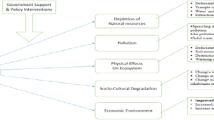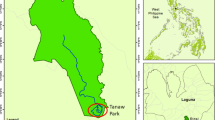Abstract
A geopark as a new tourism destination contains a number of geological heritage sites. Geoparks as an innovation for the protection of natural and geological heritage are a network of sites for the transfer of Earth knowledge and the popularisation of geosciences. Moreover, geoparks play an important role in rural development through local involvement in geopark and geotourism activities. This paper discusses the role played by geoparks in the conservation and geo-knowledge management. To this end, 25 geopark strategies were analysed (20 in Europe and three in Asia: Malaysia, Japan and Iran; one in Australia and one in South America: Brazil). The results indicate that finding, introducing and establishing geosites are the first steps for geopark creation. Furthermore, involving local communities in the conservation of geoparks and providing educational projects are key factors in the knowledge management and preservation of geoparks as new tourist attractions.




Similar content being viewed by others
References
Anderson DE, Brown EJ (2010) Perspectives on Quaternary outreach and aspirations for the future. Proc Geol Assoc 121(4):455–467
Buhalis D (2003) e tourism. Information technology for strategic tourism management. Pearson, London
Burek CV, Prosser CD (2008) The history of geoconservation: an introduction. In: Burek CV, Prosser CD (eds) The history of geoconservation. The Geological Society, London, UK, pp 1–5
Catana MM, Rocha D (2009) The role of the educational programs on tourism development of Naturtejo and Arouca geoparks. In: Neto de Carvalho C, Rodrigues J (ed), Proceedings of 8th European Geoparks Conference, 14-16 September, Idanha-a-Nova, Portugal, pp 61-65
Chris H, Mark P, Gusztav N (2005) Understanding informal institutions: networks and communities in rural development. In: Proceeding of Transition in Agriculture, Agricultural Economics in Transition II Institute of Economics Hungarian Academy of Science, 28-29 October, Budapest , Hungary, pp 1-20
Cooper C (2006) Knowledge management and tourism. Ann Tour Res 33(1):47–64
Day G (1998) Working with the grain? Towards sustainable rural and community development. J Rural Stud 14(1):89–105
Demarest M (1997) Understanding knowledge management. Long range planning, Elsevier Ltd, 30 (3): 374-384
Eder F, Patzak M (2004) Geoparks—geological attractions: a tool for public education, recreation and sustainable economic development. UNESCO, Division of Earth Sciences, France, pp 162–164
Farsani NT, Coelho C, Costa C, Neto de Carvalho C (2012) Geoparks and geotourism: new approaches to sustainability for the 21st century. Brownwalker press Publisher, Florida, USA
Geraldes J, Ferreira R (2009) Tourism: “tectonics” and geo-bakery. In: Neto de Carvalho C, Rodrigues J (ed) Proceedings of 8th European Geoparks Conference, 14-16 September, Idanha-a-Nova, Portugal, pp 100-103
GGN (2010) UNESCO Division of Ecological and Earth Sciences Global Earth Observation Section Geoparks Secretariat http://unesdoc.unesco.org/images/0015/001500/150007e.pdf. Accessed 26 June 2010
Gray M (2004) Geodiversity: valuing and conserving abiotic nature. J. Wiley & Sons, Ltd, New York, pp 81–112
Hall M (2005) Rural wine and food tourism cluster and network development. In: Hall DR, Kirkpatrick I, Mitchell M (eds) Rural tourism and sustainable business. British Library Cataloguing, UK, pp 149–164
Hawkins DE (2006) Transferring tourism knowledge. J Qual Assur Hosp Tour 7(1):13–27
Heitzmann P, Reynard E, Stürm B (2006) Geotopschutz in der Schweiz—quo vadis? Schrif tenreihe der Deutschen Gesellschaft für Geowissen schaften 44:48–54
Hjalager AM (2002) Repairing innovation defectiveness in tourism. Tour Manag 2002(23):465–474
Iantria LA (2011) Realizing the geotourism dream: a new university degree for a new kind of tourism. In: D. Rocha, Sá A (ed) Proceedings of International Congress Arouca 2011, Arouca, Portugal, 2011, pp 19
Johnson CP, Sheth HC, Ollier CD (2010) Geological attractions for tourists in Mauritius. In: Dowling RK, Newsome D (eds) Global Geotourism Perspectives. Goodfellow Publishers, UK, pp 3–15
Lee J, Arnason A, Nightingale A, Shucksmith M (2005) Networking: social capital and identities in European rural development. Sociol Rural 45(4):270–283
Liebowitz J (1999) Knowledge management handbook. CRC Press, Boca Raton
Lowe P, Murdach J, Ward N (1995) Networks in rural development: beyond exogenous and endogenous models. In: Ploeg JDV, Dijk GV (eds) Beyond modernization: the impact of endogenous rural development. Van Gorcum and Comp, Netherland, pp 87–104
Murdoch J (2000) Networks—a new paradigm of rural development. J Rural Stud 16:407–419
Nonaka I (1991) The knowledge creating company. Harv Bus Rev 69(6):96–104
Oxford Dictionary, Knowledge (2012) http://oxforddictionaries.com/definition/knowledge#m_en_us1261368. Oxford University Press. Accessed 26 September 2012
Pereira P, Pereira D, Caetano Alves MI (2007) Geomorphosite assessment in Montesinho Natural Park (Portugal). Geographica Helvetica. Jg. 62 2007/Heft 3, 2007, pp 159-168
Reimold WU (1999) Geoconservation—a southern African and African perspective. J Afr Earth Sci 29(3):469–483
Reynard E, Coratza P (2007) Geomorphosites and geodiversity: a new domain of research. Geogr Helv Swiss J Geogr 62(3):138–139
Richardson S, Shakespeare E (2009) Dunhill Ecopark—working locally for a global change. Rural Policy News 1(2):11–14
Röhling HG, Thomé MS (2004) Geoscience for the public: geotopes and national geoparks in Germany. Episodes 27(4):279–283
Romeiro P, Costa C (2010) The potential of management networks in the innovation and competitiveness of rural tourism: a case study on the Valle del Jerte (Spain). Curr Issues Tour 13(1):75–91
Sobels J, Curtis A, Lockie S (2001) The role of Landcare group networks in rural Australia: exploring the contribution of social capital. J Rural Stud 17:265–276
Standards Australia (2003) Interim Australian standard, knowledge management. Standards Australia International Ltd., NSW
Strasser A, Heitzmann P, Jordan P, Stapfer A, Stürm B (1995) A. Vogel, Géo-topes et la protection des objets géologiques en Suisse: un rapport stratégique—Fribourg: Groupe suisse pour la protection des géotopes
Sveiby EK (2001) What is knowledge management? http://www.sveiby.com/articles/KnowledgeManagement.html. Accessed 26 September 2011
Tavares A (2011) Geotourism: geoaccessible. In: Rocha D, Sá A (eds) Proceedings of International Congress Arouca 2011. Arouca, Portugal, p 67
UNESCO (2006) Global Geoparks Network. UNESCO Division of Ecological and Earth Sciences Global Earth Observation Section Geoparks Secretariat. http://unesdoc.unesco.org/images/0015/001500/150007e.pdf. Accessed 17 November 2009
Weiermair K (2006) Innovation and growth in tourism, organisation for economic cooperation and development (OECD), French, pp: 55-66
Wiedenbien FW (1994) Origin and use of the term ‘geotope’ in German-speaking countries. In: O’Halloran D, Green C, Harley M, Stanley M, Knill J (eds) Geological and Landscape Conservation. Geological Society, London, pp 117–120
Wimbledon WAP (1996) Geosites—a new conservation initiative. Episodes J Int Geosci 19(3):87–88
Acknowledgments
Firstly, our appreciation goes to FCT (Fundação para a Ciência e a Tecnologia) for supporting this paper which is a part of PhD thesis of the first author. In addition, the authors wish to thank Margarete Patzak—the director of the Division of earth sciences in UNESCO—for her contribution in collecting questionnaires, and they also appreciate the help of managers and officials for providing the requested information.
Author information
Authors and Affiliations
Corresponding author
Rights and permissions
About this article
Cite this article
Farsani, N.T., Coelho, C.O.A., Costa, C.M.M. et al. Geo-knowledge Management and Geoconservation via Geoparks and Geotourism. Geoheritage 6, 185–192 (2014). https://doi.org/10.1007/s12371-014-0099-7
Received:
Accepted:
Published:
Issue Date:
DOI: https://doi.org/10.1007/s12371-014-0099-7




